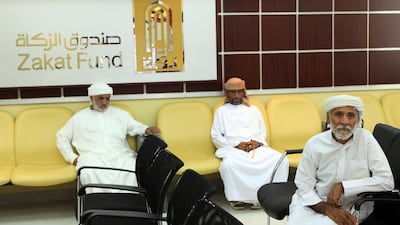Islam is built upon five pillars that form the foundation for a Muslim’s faith. This Ramadan, The National explained each of the five mandatory acts a Muslim must perform in their lifetime, beginning with fasting, prayer, Hajj, shahada and now finally: zakat.
Zakat is not just a fundamental pillar of Islam; it is also a potential way of easing the suffering of millions of people through a sustained charitable effort.
Unlike sporadic donations to charity, zakat is a sustained payment calculated based on the payer’s income using a percentage — similar to a tax.
“It’s not a strange concept to modern countries,” said cleric Sheikh Dr Ahmad Al Kubaisi, a leading Muslim scholar and founder of the Ulama Organisation, a group of imams and scholars who debate in Iraq.
“Zakat is basically like taxes but, while taxes go towards the country, zakat goes to those who are in need,” he said.
Zakat is mandatory to all adult Muslims who earn a minimum amount of money each year — known as nisab. Traditionally, the nisab threshold was 87.48 grams of gold or 612.36g of silver. As a result, the monetary value of nisab varies according to current prices and currencies.
Those eligible to pay zakat, must pay 2.5 per cent of their cumulative wealth to charity each year. This payment is said to “purify” a Muslim’s wealth.
The sustained payment is different to sadaqat, which are individual and uncontinuous contributions to a charity. The aim of zakat is to remove the uncertainty for when the next payment might be.
"Zakat is obligatory just like the five prayers a day so that no needy person would have to wait for donations," said Dr Al Kubaisi.
The importance of this annual payment is repeatedly highlighted in the Quran.
"And be steadfast in prayer and in paying zakat and whatever good you send forth for your souls before you, you shall find it with Allah for Allah sees well all that you do," [Al Baqarah: 110].
"You will find Zakat associated with prayer in many other verses of the Quran to highlight its importance and to remind people that, on judgment day, they will be asked about it," Dr Al Kubaisi said.
He said that, similar to Hajj, zakat is only expected of people who have financial means, are physically able to donate the money and are not in debt. He said they should be in “complete possession of the money after the elapse of one year”.
There are two different types of zakat. Zakat Al Mal is the “cleansing of wealth” that is done through the annual donation of a percentage of a persons income to charity. Zakat Al Fitr is a donation to charity given during Ramadan and before Eid Al Fitr, in the form of food.
Every adult Muslim who possesses food in excess of their own needs must pay a minimum of two qadahs (an old measure equalling just over two kilograms) of flour, wheat, barley or rice from each person in a household.
"It's prescribed in Hadith [the Prophet's teachings] as purification for the fasting person from idle and obscene talk, and its purpose if to feed the poor and have them enjoy breaking their fast and Eid like the rest of us," said Dr Al Kubaisi.
Both forms of Zakat can be paid either online, through charities or the UAE’s own Zakat Fund, or by sourcing charities and making the donation personally.
In the UAE, the Zakat Fund accepts donations through their website and at stalls located around the country and passes the money on to registered charities. The Fund was established in 2003 by the UAE’s Founding Father Sheikh Zayed to provide a regulated way of paying zakat that guaranteed the money would be delivered to people in need. Last year, about 128,000 people paid Dh212 each to the Zakat Fund in Abu Dhabi. The money was used towards improving the living conditions of 1,1208 families, elderly Emiratis and divorced or widowed women.


